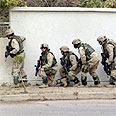
US: 2 committees look for way out of Iraq
President Bush reluctant to set fixed timetable for withdrawing American troops from Iraq. Two prominent committees say such timetable is necessary. Former special envoy to Middle East Dennis Ross concurs. Unclear if Bush will adopt their recommendations
WASHINGTON - While US President George W. Bush refuses to set a date for withdrawal from Iraq, Washington is starting to talk seriously about a graduated exit plan for US soldiers to leave Iraq.
Two committees are grappling with the issue: A committee within the Pentagon and a civilian committee, the Iraq Study Group launched by the US Institute of Peace, co-chaired by former Secretary of State James Baker and former Democrat congressman Lee Hamilton, who also served as Vice Chairman of the 9/11 Commission.
The tactic recommended by these commissions is opposite of that proposed by President Bush. The administration is refusing to declare a clear timetable for withdrawal, which they justify by claiming that terrorist and rebel groups in Iraq will wait until the date the American are set to leave to start fighting.
However, the two aforementioned committees have reached the opposite conclusion. They believe fighting is going full force already and will only get worse. Therefore, they believe, it is necessary to set a fixed date for withdrawing American forces in order to pressure the Iraqi government to take more responsibility.
The Iraq Study Group, co-chaired by Baker and Hamilton, has yet to issue its recommendations, but it has already leaked the development of an option for controlled withdrawal.
David Martin, senior military reporter for CBS, reported that according to a source in the committee, the Iraq Study Group will recommend that five percent of the American forces in Iraq will evacuate every two months. This way, the Americans will pressure the Iraqis to take command.
Lieutenant General John Sattler of the Marines Expeditionary Force, who led the American attack on Falluja, is chairing the Pentagon committee. His committee has also developed a mechanism for establishing a timetable that will compel the Iraqi forces to take over responsibility from the American forces.
Uncertain if Bush is onboard
President Bush has yet to receive the committees' recommendations and it is still unclear if he has any intention to adopt them, but there are reports stating that the situation in the country is getting worse and is expected to deteriorate further throughout 2007. Public pressure is growing in the US.
Baker and Hamilton recently went on a four-day tour of Iraq during which they met dozens of leaders. They met with senior American commanders in Iraq and the US. All in all, they met with upwards of 150 people, including every expert possible.
All signs show that their recommendations have already been prepared and will be presented to the president, Congress, and to the American public immediately after the congressional elections.
They have announced that their committee won't deal with the past, won't look to point fingers or to find who is to blame, will cross party differences and will try to find a practical solution to the problem.
However, in Baker's recently published book, Baker himself counted the mistakes made by the US, including in particular dismantling the Iraqi army and not sending enough American troops to Iraq during the war and after it. This list stands in stark contradiction with current Secretary of State Donald Rumsfeld's stance.
Baker said that it is unclear if the administration and Congress will adopt the committee's recommendations, but it is well-known that he meets regularly with President Bush making it hard to believe that the two aren't in agreement.
Iraqis should be informed
Hamilton hinted over the weekend in a joint interview with Baker to the public television network PBS that the Iraqi government must be told that it has four or five months to take the necessary steps to improve the security of the country, to act for national reconciliation, and to start providing the basic services that any government needs to provide, such as water and electricity.
Dennis Ross, Clinton's special envoy to the Middle East, wrote Sunday in the Washington Post, "President Bush should inform (Iraqi Prime Minister Nouri) Maliki that we will not impose a deadline for withdrawal but we are going to negotiate with his government a timetable for our departure."
Ross explains that the difference between a deadline and an agreed timetable is that in the latter, all parties involved know that "the clock is ticking and if they don't begin to get serious about reconciliation and about fulfilling their own responsibilities they face the abyss."
"If the Iraqis create a real national compact, the United States can be more flexible on its timetable for withdrawal," Ross conceded.










